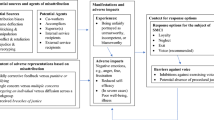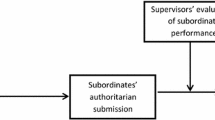Abstract
Representational predicaments reflect unfavorable perceptual or attributional incongruence between subordinates and superiors about the employees’ work, and adversely affect morale. Critical incident interviews were held with 63 Hong Kong Chinese employees from over 50 organizations. Stories about undervaluation of contextual performance were compared with stories about duly appreciated contextual performance, and stories about negative spotlighting (disproportionate emphasis on shortcomings or mistakes) were compared with stories about fair treatment of mistakes. Subordinates attributed undervaluation of contextual performance to: the superior’s unfamiliarity with the employee’s work, the superior’s perception that the work was of marginal importance, the subordinate’s lack of empowerment to report contextual performance, the lack of considerate attention by the superior, and the subordinate’s felt need to keep a low profile. Underlying factors were inhibitions against employee voice, leadership styles characterized by lack of benevolence and lack of individualized consideration, and absence of close subordinate-superior relationships. Subordinates attributed negative spotlighting to: the superior’s abusive behavior, prejudicial and hostile attitudes, or insistence on one “right way”; rivalry between the superior and the subordinate; and the absence of legitimate channels for upward feedback. Underlying factors were absence of just grievance procedures, and leadership styles characterized by authoritarianism, which could be compounded by lack of benevolence and lack of moral restraint, leading to abusive supervision. Cross-cultural research could establish whether large power distance and other cultural and institutional factors render Asian employees especially vulnerable to representational predicaments.



Similar content being viewed by others
References
Amabile, T. M., Hill, K. G., Hennessey, B. A., & Tighe, E. M. 1994. The work preference inventory: Assessing intrinsic and extrinsic motivational orientations. Journal of Personality and Social Psychology, 66(5): 950–967.
Aryee, S., Sun, L. Y., Xiong, Z., Chen, G., & Debrah, Y. A. 2008. Abusive supervision and contextual performance: The mediating role of emotional exhaustion and the moderating role of work unit structure. Management and Organization Review, 4(3): 393–411.
Atwater, L. A. 1988. The relative importance of situational and individual variables in predicting leader behavior: The surprising impact of subordinate trust. Group & Organization Studies, 13(3): 290–310.
Barley, S. R. 1996. Technicians in the workplace: Ethnographic evidence for bringing work into organization studies. Administrative Science Quarterly, 41(3): 404–440.
Baron, J. N., & Kreps, D. M. 1999. Consistent human resource practices. California Management Review, 41(3): 29–53.
Bass, B. M., & Avolio, B. J. 1990. Transformational leadership development: Manual for the multifactor leadership questionnaire. Palo Alto, CA: Consulting Psychologists Press.
Bass, B. M., & Avolio, B. J. 1994. Improving organizational effectiveness through transformational leadership. Thousand Oaks, CA: Sage.
Bell, N. E., & Tetlock, P. E. 1989. The intuitive politician and the assignment of blame in organizations. In R. A. Giacalone & P. Rosenfeld (Eds.). Impression management in the organization: 105–124. Hillsdale, NJ: Lawrence Erlbaum.
Bemmels, B., Brown, G., & Read, R. 2009. A restorative justice perspective on grievance procedures. Paper presented at the 15th World Congress of the International Industrial Relations Association, Sydney, Australia, August.
Bemmels, B., & Foley, J. R. 1996. Grievance procedure research: A review and theoretical recommendations. Journal of Management, 22(3): 359–384.
Biernacki, P., & Waldorf, D. 1981. Snowball sampling: Problems and techniques of chain referral sampling. Sociological Methods and Research, 10(2): 141–163.
Bitner, M. J., Booms, B. H., & Mohr, L. A. 1994. Critical service encounters: The employee’s viewpoint. Journal of Marketing, 58(4): 95–106.
Bitner, M. J., Booms, B. H., & Tetreault, M. S. 1990. The service encounter: Diagnosing favorable and unfavorable incidents. Journal of Marketing, 54(1): 71–84.
Boje, D. M. 1999. Nike, Greek goddess of victory or cruelty? Women’s stories of Asian factory life. Journal of Organizational Change Management, 2(8): 461–480.
Boje, D. M. 2001. Narrative methods for organization research and communication research. London: Sage.
Bond, M. H., & Hwang, K. K. 1987. The social psychology of Chinese people. In M. H. Bond (Ed.). The psychology of the Chinese people: 213–266. Hong Kong: Oxford University Press.
Brannen, J. 1988. The study of sensitive subjects. Sociological Review, 36(3): 552–563.
Brown, R. B., & Brooks, I. 2002. Emotion at work: Identifying the emotional climate of night nursing. Journal of Management in Medicine, 16(5): 327–344.
Bruch, H., & Walter, F. 2007. Leadership in context: Investigating hierarchical impacts on transformational leadership. Leadership & Organization Development Journal, 28(8): 710–726.
Burrell, G., & Morgan, G. 1979. Sociological paradigms and organizational analysis. London: Heinemann.
Cascio, W. F. 2006. Global performance management systems. In I. Bjorkman & G. Stahl (Eds.). Handbook of research in international human resource management: 176–196. London: Edward Elgar Ltd.
Chan, S. C. H., & Mak, W. M. 2011. Benevolent leadership and follower performance: The mediating role of leader–member exchange (LMX). Asia Pacific Journal of Management. doi:10.1007/s10490-011-9275-3.
Cheng, B. S., Chou, L. F., Wu, T. Y., Huang, M. P., & Farh, J. L. 2004a. Paternalistic leadership and subordinate responses: Establishing a leadership model in Chinese organizations. Asian Journal of Social Psychology, 7(1): 89–117.
Cheng, B. S., Huang, K. L., Lu, H. C., & Huang, M. P. 2004. Leadership in Taiwanese enterprises. In D. Tjosvold & K. Leung (Eds.). Leading in high growth Asia: Managing relationship for teamwork and change. 83–108. London: World Scientific.
Chi, S. C. 1997. Perceptual differences between business chin-sins and other employees: An empirical study. Journal of Management and Information, 2: 55–75.
Chiu, S. W. K., So, A. Y., & Tam, M. Y. M. 2008. Flexible employment in Hong Kong: Trends and patterns in comparative perspective. Asian Survey, 48(4): 673–702.
The Chinese Culture Connection. 1987. Chinese values and the search for culture-free dimensions of culture. Journal of Cross-Cultural Psychology, 18(2): 143–164.
Conklin, T. A. 2007. Method or madness: Phenomenology as knowledge creator. Journal of Management Inquiry, 16(3): 275–287.
Creswell, J. W. 1994. Research design: Qualitative and quantitative approaches. Thousand Oaks, CA: Sage.
Creswell, J. W. 1998. Qualitative inquiry and research design: Choosing among five traditions. London: Sage.
Dalal, R. S. 2007. Contextual performance/prosocial behavior/organizational citizenship behavior. In S. G. Rogelberg (Ed.). Encyclopedia of industrial/organizational psychology, 1: 103–106. Thousand Oaks, CA: Sage.
Duckitt, J. 2009. Authoritarianism and dogmatism. In M. R. Leary & R. H. Hoyle (Eds.). Handbook of individual differences in social behavior: 298–317. New York: Guilford Press.
Eastman, K. K. 1994. In the eyes of the beholder: An attributional approach to ingratiation and organizational citizenship behavior. Academy of Management Journal, 37(5): 1379–1391.
Entrekin, L., & Chung, Y. W. 2001. Attitudes towards different sources of executive appraisal: A comparison of Hong Kong Chinese and American managers in Hong Kong. International Journal of Human Resource Management, 12(6): 963–987.
Farh, J. L., & Cheng, B. S. 2000. A cultural analysis of paternalistic leadership in Chinese organizations. In J. T. Li, A. S. Tsui & E. Weldon (Eds.). Management and organizations in the Chinese context: 94–127. London: Macmillan.
Flanagan, J. C. 1954. The critical incident technique. Psychological Bulletin, 51(4): 327–359.
Fletcher, J. K. 1995. Radically transforming work for the 21st century: A feminist reconstruction of “real” work: 448–452. Academy of Management Annual Meetings: Best paper Procedings.
Fletcher, J. K. 1998. Relational practice: A feminist reconstruction of work. Journal of Management Inquiry, 7(2): 163–186.
Gabriel, Y. 1995. The unmanaged organisation: Stories, fantasies, subjectivity. Organization Studies, 16(3): 477–501.
Gabriel, Y. 1998. An introduction to the social psychology of insults in organizations. Human Relations, 51(11): 1329–1354.
Gabriel, Y. 2000. Storytelling in organizations: Facts, factions, and fantasies. Oxford: Oxford University Press.
Gladwell, M. 2008. The ethnic theory of plane crashes: “Captain, the weather radar has helped us a lot”. In M. Gladwell (Ed.). Outliers: The story of success: 177–223. New York: Little, Brown & Co.
Glaser, B. G., & Strauss, A. L. 1967. The discovery of grounded theory: Strategies for qualitative research. New York: Aldine de Gruyter.
Graen, G., & Schiemann, W. 1978. Leader-member agreement: A vertical dyad linkage approach. Journal of Applied Psychology, 63(2): 206–212.
Grant, A. M., & Hofmann, D. A. 2011. Role expansion as a persuasion process: The interpersonal influence dynamics of role definition. Organizational Psychology Review, 1(1): 9–31.
Griffith, J. 2004. Relation of principal transformational leadership to school staff job satisfaction, staff turnover, and school performance. Journal of Educational Administration, 42(3): 333–356.
Halcrow, A. 2002. Navigating the new landscape of workplace privacy rights. Employee Relations Today, 29(1): 45–53.
Hamilton, B. E., & Manias, E. 2007. Rethinking nurses’ observations: Psychiatric nursing skills and invisibility in an acute inpatient setting. Social Science & Medicine, 65(2): 331–343.
Hampson, I., & Junor, A. 2005. Invisible work, invisible skills: Interactive customer service as articulation work. New Technology, Work and Employment, 20(2): 166–181.
Hernez-Broome, G., & Hughes, R. L. 2004. Leadership development: Past, present, and future. Human Resource Planning, 27(1): 24–32.
Hofstede, G. H. 2001. Culture’s consequences: Comparing values, behaviors, institutions, and organizations across nations. Thousand Oaks, CA: Sage.
Hofstede, G., Hofstede, G. F., & Minkov, M. 2010. Cultures and organizations: Software of the mind: Intercultural cooperation and its importance for survival, 3rd ed. New York: McGraw-Hill.
Hornby, P., & Symon, G. 1994. Tracer studies. In C. Cassell & G. Symon (Eds.). Qualitative methods in organizational research: A practical guide: 167–186. London: Sage.
Huang, L. 2010. Cultural psychology: The power distance index and Asian culture, www.8asians.com/2010/01/23/cultural-dimensions-power-distance/. Accessed Jan. 10, 2012.
Hyde, P. 2008. Working with stories: Diverse tales of organizational life. Qualitative Research in Organizations and Management, 3(2): 147–158.
International Labour Organization. 2012. Employment protection security index, http://www.ilo.org/dyn/sesame/SESHELP.NoteEPSI#outcome. Accessed Jan. 13, 2012.
Kanov, J. M., Maitlis, S., Worline, M. C., Dutton, J. E., Frost, P. J., & Lillius, J. M. 2004. Compassion in organizational life. American Behavioral Scientist, 47(6): 808–826.
Koch, T. 1998. Storytelling: Is it really research?. Journal of Advanced Nursing, 28(6): 1182–1190.
Korczynski, M. 2003. Communities of coping: Collective emotional labour in service work. Organization, 10(1): 55–79.
Kunda, Z., & Fong, G. 1993. Directional questions direct self-conceptions. Journal of Experimental Social Psychology, 29(1): 63–86.
Kvale, S. 1996. Interviews: An introduction to qualitative research interviewing. Thousand Oaks, CA: Sage.
Lai, J. Y. M., Lam, L. W., & Liu, Y. 2010. Do you really need help? A study of employee supplication and job performance in China. Asia Pacific Journal of Management, 27(3): 541–559.
Leung, A. S. M. 2002. Sexuality at work: Female secretaries’ experiences in the context of Chinese culture. Journal of Managerial Psychology, 17(6): 506–522.
Leung, A. S. M. 2008. Interpersonal conflict and resolution strategies: An examination of Hong Kong employees. Team Performance Management, 14(3/4): 165–178.
Leung, K., & Rensvold, R. 2002. Survey on quality of work life of Hong Kong employees. Paper presented at the 2002 annual conference of the Hong Kong Psychological Society, Hong Kong.
Lyons, T. 1971. Role conflict, need for clarity, satisfaction, tension, and withdrawal. Organizational Behavior and Human Performance, 6(1): 99–110.
Martinko, M. J., & Gardner, W. L. 1987. The leader/member attribution process. Academy of Management Review, 12(2): 235–249.
McKenna, S. 2005. Organisational commitment in the small entrepreneurial business in Singapore. Cross Cultural Management, 12(2): 16–37.
Merritt, A. 2000. Culture in the cockpit: Do Hofstede’s dimensions replicate?. Journal of Cross-Cultural Psychology, 31(3): 283–301.
Miles, M. B., & Huberman, A. M. 1994. Qualitative data analysis, 2nd ed. Thousand Oaks, CA: Sage.
Money Matters. 2001. Tribute to Brendan Roche, R.I.P. Money Matters, September, 15. http://www.mabs.ie/publications/MoneyMatters_Mag/MM01_02.pdf. Accessed Jul. 18, 2011.
Motowildo, S. J., & van Scotter, J. R. 1994. Evidence that task performance should be distinguished from contextual performance. Journal of Applied Psychology, 79(4): 475–480.
Moustakas, C. 1994. Phenomenological research methods. Thousand Oaks, CA: Sage.
Ng, S. H. 2010. Labour law in Hong Kong. Alphen aan den Rijn, NL: Kluwer Law International.
Ngo, H.-Y., Tang, C. S. K., & Au, W. W. T. 2002. Behavioural responses to employment discrimination: A study of Hong Kong workers. International Journal of Human Resource Management, 13(8): 1206–1223.
Nisbett, R. E., & de Wilson, T. C. 1977. Telling more than we can know: Verbal reports on mental processes. Psychological Review, 84(3): 231–259.
O’Donohoe, S., & Turley, D. 2006. Compassion at the counter: Service providers and bereaved consumers. Human Relations, 59(10): 1429–1448.
Olson-Buchanan, J. B. 1997. To grieve or not to grieve: Factors related to voicing discontent in an organizational simulation. International Journal of Conflict Management, 8(2): 132–147.
Orr, J. E. 1996. Talking about machines: An ethnography of a modern job. Ithaca, NY: ILR Press/Cornell University Press.
Pan, Y. 2000. Politeness in Chinese face-to-face interaction. Stamford, CT: Ablex.
Podsakoff, P. M., Mackenzie, S. B., Moorman, R. H., & Fetter, R. 1990. Transformational leader behaviors and their effects on follows’ trust in leader, satisfaction, and organizational citizenship behaviors. Leadership Quarterly, 1: 107–142.
Posner, R. A. 1997. Aging and old age. Chicago: University of Chicago Press.
Price, J. L. 1977. The study of turnover. Ames, IA: Iowa State University Press.
Rafferty, A. E., & Griffin, M. A. 2006. Refining individualized consideration: Distinguishing developmental leadership and supportive leadership. Journal of Occupational and Organizational Psychology, 79(1): 37–61.
Runcie, J. F. 1980. By days I make the cars. Harvard Business Review, 58(3): 106–115.
Sankar, Y. 2003. Character not charisma is the critical measure of leadership excellence. Journal of Leadership and Organizational Studies, 9(4): 45–55.
Shenkar, O. 1994. The People’s Republic of China: Raising the bamboo screen through international management research. International Studies of Management and Organization, 24(1, 2): 9–34.
Snell, R. S. 1999. Managing ethically. In L. Fulop & S. Linstead (Eds.). Management: A critical text: 335–363. South Yarra, Victoria, AU: Macmillan Education.
Snell, R. S., Tjosvold, D., & Fang, S. S. 2006. Resolving ethical conflicts at work through cooperative goals and constructive controversy in the People’s Republic of China. Asia Pacific Journal of Management, 23(3): 319–343.
Snell, R. S., & Wong, M. M. L. 2009. Representational predicaments at three Hong Kong sites. Organization Studies, 30(7): 779–802.
Snell, R. S., Wong, M. L., & Hui, S. K. 2009. Ethical issues concerning the experience of representational predicaments at work. Working paper no. 063–0890, Hong Kong Institute of Business Studies, Lingnan University, Hong Kong, China.
Spiegelberg, H. 1978. The essentials of the phenomenological method. In H. Spiegelberg (Ed.). The phenomenological movement: A historical introduction, 2nd ed., vol. 2: 653–701. The Hague, NL: Martinus Nijhoff.
Star, S. L., & Strauss, A. L. 1999. Layers of silence, arenas of voice: The ecology of visible and invisible work. Computer Supported Collaborative Work, 8(1, 2): 9–30.
Suchman, L. 1995. Representations of work: Making work visible. Communications of the Association for Computing Machinery, 38(9): 56–64.
Suchman, L., Blomberg, J., Orr, J., & Trigg, R. 1999. Reconstructing technologies as social practice. American Behavioural Scientist, 43(3): 392–408.
Suls, J., Lemos, K., & Stewart, H. L. 2002. Self-esteem, construal, and comparisons with the self, friends and peers. Journal of Personality and Social Psychology, 82(2): 252–261.
Swierczek, F. W., & Onishi, J. 2003. Culture and conflict: Japanese managers and Thai subordinates. Personnel Review, 32(2): 187–210.
Tepper, B. J. 2007. Abusive supervision in work organizations: Review, synthesis, and research agenda. Journal of Management, 33(3): 261–289.
Terpstra-Tong, J., & Ralston, D. A. 2002. Moving toward a global understanding of upward influence strategies: An Asian perspective with directions for cross-cultural research. Asia Pacific Journal of Management, 19(2–3): 373–404.
Tjosvold, D. 1985. Power and social context in superior-subordinate interaction. Organizational Behavior and Human Decision Processes, 35(3): 281–293.
van Kaam, A. L. 1969. Existential foundations of psychology. New York: Image Books.
van Dierendonck, D., Haynes, C., Borrill, C., & Stride, C. 2007. Effects of upward feedback on leadership behaviour toward subordinates. Journal of Management Development, 26(3): 228–238.
Wang, Z., Chen, Y. F., Tjosvold, D., & Shi, K. 2010. Cooperative goals and team personality composition for constructive controversy in China. Asia Pacific Journal of Management, 27(1): 139–153.
White, M. C., Crino, M. D., & Hatfield, J. D. 1985. An empirical examination of the parsimony of perceptual congruence scores. Academy of Management Journal, 28(3): 732–737.
Wilhelm, C. C., Herd, A. M., & Steiner, D. D. 1993. Attributional conflict between managers and subordinates: An investigation of leader-member exchange effects. Journal of Organizational Behavior, 14(6): 531–543.
Withey, M. J., & Cooper, W. H. 1989. Predicting exit, voice, loyalty, and neglect. Administrative Science Quarterly, 34(4): 521–539.
Wong, G. Y. Y., & Birnbaum-More, P. H. 1994. Culture, context and structure: A test on Hong Kong banks. Organization Studies, 15(1): 99–123.
Wrzesniewski, A., & Dutton, J. E. 2001. Crafting a job: Revisioning employees as active crafters of their work. Academy of Management Review, 26(2): 179–201.
Author information
Authors and Affiliations
Corresponding author
Rights and permissions
About this article
Cite this article
Snell, R.S., Wong, M.Ml., Chak, A.Mk. et al. Representational predicaments at work: How they are experienced and why they may happen. Asia Pac J Manag 30, 251–279 (2013). https://doi.org/10.1007/s10490-012-9286-8
Published:
Issue Date:
DOI: https://doi.org/10.1007/s10490-012-9286-8




